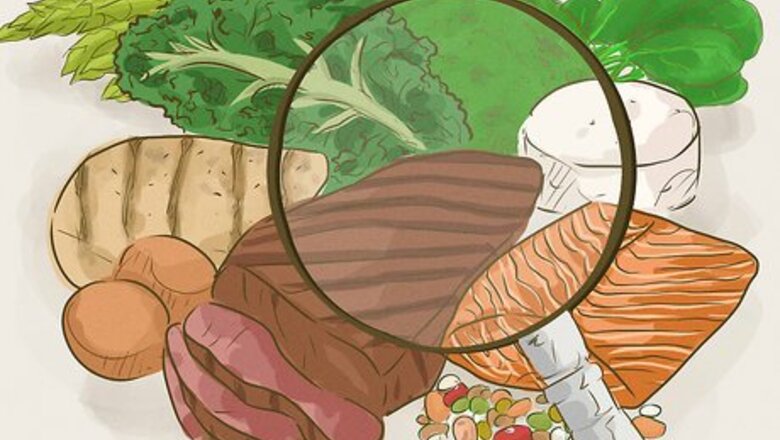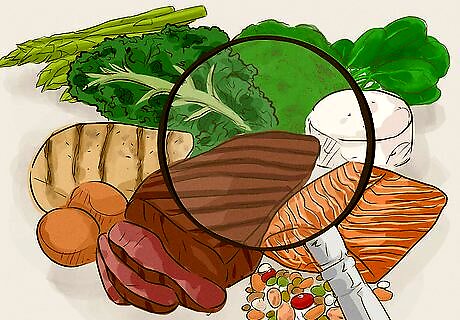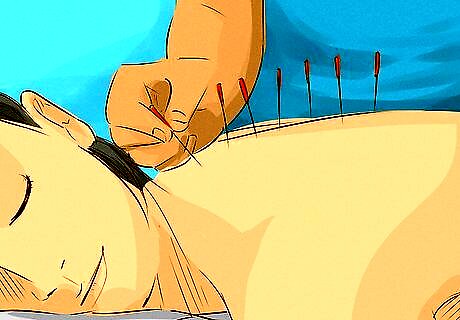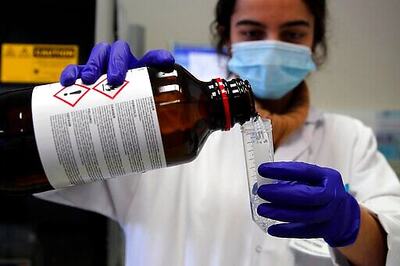
views
Eating to Strengthen Your Immunity

Follow a balanced, healthy diet. Eating a healthy, balanced diet as part of your normal lifestyle is ideal. However, if you are just looking to make some positive lifestyle changes before surgery to aid your recovery, then altering your diet is a great place to start. Focus on eating whole foods, such as fruits, vegetables, whole grains, lean proteins, and low-fat dairy products. Reduce your intake of fried, processed, and sugary foods. Try to steer clear of fast food, baked goods, and snacks like chips and crackers. Drink plenty of water. Cut back on sugary beverages, such as soda and juices. Instead, try to get most of your fluid intake from water. Aim for at least eight 8 ounce glasses of water daily. Talk to your doctor for advice about how to improve your diet. Your doctor may be able to make specific recommendations based on your needs and diagnosis.

Find foods rich in Vitamin A. Vitamin A can boost your immunity while reducing the risk for infection. You should look for foods that are high in this nutrient. This includes: Carrots Sweet potatoes Pumpkin Squash Beef liver Beans

Eat vegetables and fruits high in Vitamin C. Vitamin C is another important vitamin for immunity, but you can get enough of it from your diet without having to take a supplement. Good foods include: Citrus such as oranges and lemons Spinach Kale Bell peppers Brussels sprouts

Increase your Vitamin D intake. Some types of surgery, such as heart surgery and bariatric surgery, may contribute to Vitamin D deficiency. Increasing your Vitamin D intake before surgery make help reduce this side effect. You can do this by taking a vitamin or by eating Vitamin D rich foods. Good foods include fortified milk products, fortified cereals, and fatty fish such as salmon and tuna.

Boost your iron levels. Iron is essential to help your blood carry oxygen. Taking iron supplements before surgery may reduce your risk of needing a blood transfusion. This is particularly true with surgeries such as joint or hip replacement. You can take iron supplements once or twice a day. You can also eat iron rich foods such as: Meat Eggs Milk Beans, Lentils Spinach Peanut butter

Consume at least 1500mg of calcium daily. Calcium is important before surgery, especially if you are having bone surgery. You should have at least 1500 mg a day. You can get calcium from: Milk products Soy products Broccoli Almonds
Relaxing and Strengthening Your Body

Find ways to relieve stress. Excess stress may affect your body in all kinds of negative ways, including making it harder for your body to heal itself. Find ways to manage your daily stress levels as part of your surgery preparation, and continue these practices following your surgery. There are many different ways that you can manage stress. Find something that works for you. Try taking a long relaxing bath after a long busy day. Call up a supportive friend or family member when you are feeling overwhelmed and talk about what is bothering you. Try yoga, tai chi, or meditation. Do deep breathing exercises or progressive muscle relaxation. Avoid using alcohol, nicotine, or drugs to deal with stress. This will have a negative effect on your body’s ability to heal itself.

Listen to music. Music may relax the listener and reduce stress, both of which are vital in improving your immune system. Listening to calm, instrumental music in the days leading up to surgery may help with your recovery. You may also try doing social musical activities, such as drum circles or singing groups.

Try acupuncture. Patients who receive a series of acupuncture treatments prior to surgery may recover faster and with less pain. This is because acupuncture may be able to boost white blood cell activity. You can try to schedule two to three sessions in the weeks before your surgery.

Get more sleep. Sleep is the body's way of rejuvenating itself. In the weeks leading up to your surgery, make sure that you get plenty of sleep to reinforce your immune system. Aim for at least seven to eight hours of rest a night.

Exercise regularly. Exercise may increase your white blood cell count. It may also prevent bacteria growth and lower stress. If you are inactive, you should start a moderate exercise program by working out every two to three days. If you exercise regularly already, you may not need to change your routine before going into surgery. Good examples of moderate exercise include: Biking Twenty to thirty minute walks Running on the treadmill Yoga

Quit smoking. While it is best for you to quit smoking entirely, you should at the very least avoid smoking for a week before you go into surgery. Smoking can interfere with your recovery by delaying wound healing and increasing your chances of infection.
Reducing Risk the Week Before Surgery

Talk to your doctor. Depending on the specific type of surgery you are receiving, your doctor may have some recommendations for you to follow the week before you have surgery. Always consult with your doctor on your diet and habits before surgery. Some questions you may want to ask your doctor: “Can I take all of my normal medications this week?” “Are there any foods or supplements that might interfere with my surgery?” “How should I prepare to heal after the surgery?” “At what point should I stop eating and drinking?” “Should I take my medication the morning of the surgery? If so, how should I take it?”

Talk to your doctor about supplements. Between one and two weeks before your surgery, you should stop all-natural herbal and vitamin supplements unless otherwise directed by your doctor. Ask your doctor specifically if you should do this. Some immune-boosting supplements such as calcium, iron, and vitamin D may still be taken with a doctor's approval. You should avoid certain herbs that may increase your chance of bleeding, such as: Turmeric Willow Bark Chamomile Cod Liver Oil

Bathe or shower the night before. Depending on the type of surgery you have, you may not be able to wash properly for days. While nurses may give you a sponge bath, you should probably wash yourself the night before you go into surgery to help ensure that you are clean.

Drink clear liquids up to two hours before. Your doctor may tell you to stop eating and drinking after midnight the day of your surgery. This is to avoid complications with your anesthesia. In many cases, however, you may be allowed to drink clear liquids up to two hours beforehand. This liquid diet will provide some energy and sustenance before your surgery. This is to prevent you from going on a total fast, which may hurt your immune system. Some good clear liquids include: Water Gatorade Broth Ginger ale Seltzer Apple, cranberry, or grape juice. Avoid citrus drinks, prune juice, or any juice with pulp. Your doctor may recommend carbohydrate rich drinks such as Ensure or Pedialyte. In certain, specific medical cases, these drinks can boost the immune system before surgery.



















Comments
0 comment